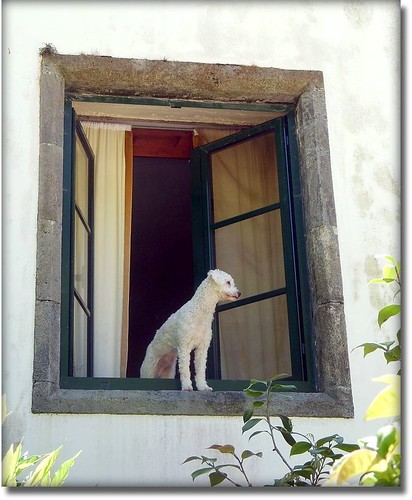
Window Dog
The dog days of summer are here, and I want to be outside on these glorious, sunny Seattle days. With a long wet winter, we tend to be hyper aware of the magnificence of our Pacific Northwest Summers. Right now there are raspberries and strawberries ripening in my garden. Flowers. Compost to be turned, potted plants luxuriating outside, needing water. The last two days I was up on Whidbey Island, about an hour north of Seattle, sitting on a deck overlooking the water and being blissfully quiet.
Where is the reflection on my work? On my practice. For the most part, right here on this blog. So I wanted to share some of the things I’m thinking about. Today’s is about the shift from me to we.
For the last two weeks I’ve been peeking in and participating peripherally in the South African online event, e/merge. Here is a bit about e/merge for context…
e/merge 2008 – Professionalising Practices is the third virtual conference on educational technology in Africa and builds on the e/merge conferences in 2004 and 2006. e/merge 2008 will take place online from 7 – 18 July 2008 and may include associated face to face events in a number of cities. The conference is primarily designed to share good practice and knowledge about educational technology innovation within the further and higher education sectors in the region, as well as to strengthen communities of researchers and practitioners.
I have been a part the first two e/merges (2004 and 2006). In 2006 we ran a little online facilitation workshop within the event and that was what Tony Carr and I were going to do this year. But through a nice accident, we both were overwhelmed and decided to shift gears to something both simpler and emergent. We decided to host three chats during the two week event around the facilitation of the event, asking the event facilitators and hosts to join us with their thoughts and observations. IT offered not only a simpler structure, but it would provide a little bit of time for reflection within the event. Wow, slowing down!
The chats attracted the event facilitators plus other participants and have been FANTASTIC. The open format with a loose theme somehow created a safe, warm and humorous place where I felt the shift from “me to we” each time. In our last chat today, we talked about how we pay attention to and invite that shift from me to we. Some of the triggers people noticed include:
- Being acknowledged as a contributor (in a reply, summary, etc.)
- Getting comfortable (posting, the technology, the people)
- Having enough space to establish an identity, then letting that go
How do you invite this transition from me to we in your facilitation, online or off? Can you share a story of when you felt or experienced this shift?
 This post from the sparky, smart and witty Vicki Scholtz is the best chuckle of the day for me. This post is a response to participation in the recent e/Merge 2008 which I blogged about last week.
This post from the sparky, smart and witty Vicki Scholtz is the best chuckle of the day for me. This post is a response to participation in the recent e/Merge 2008 which I blogged about last week.

 Pete Shelton (IFPRI of the CGIAR along with his co-blogger, Stephan Dorn) has a must read post for anyone trying to introduce “web 2” tools to their work communities. He speaks of researchers here (in international agricultural research) but I believe they apply in many other settings as well. Read the whole thing…
Pete Shelton (IFPRI of the CGIAR along with his co-blogger, Stephan Dorn) has a must read post for anyone trying to introduce “web 2” tools to their work communities. He speaks of researchers here (in international agricultural research) but I believe they apply in many other settings as well. Read the whole thing…